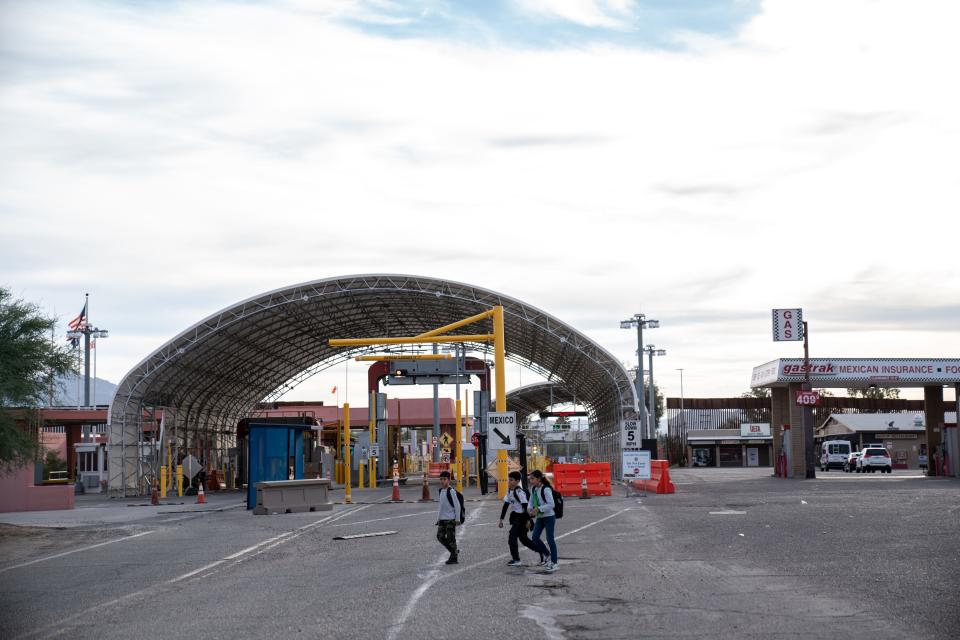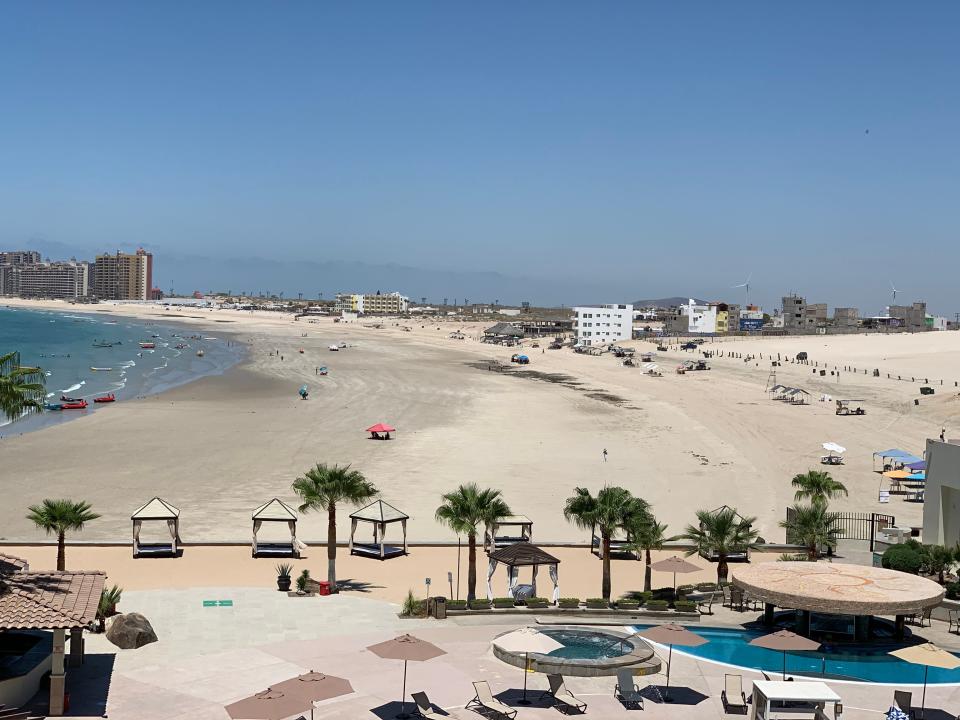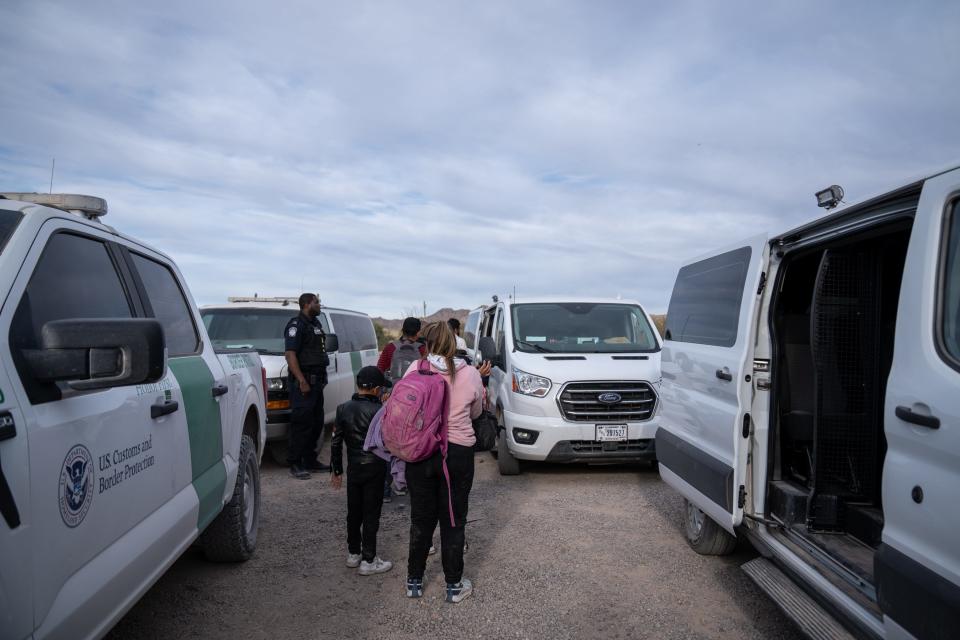Lukeville port closure brings 'devastating' effects to border residents, businesses
Lucia Gutierrez was forced to make a choice.
She could maintain her job in Ajo, Arizona, or stay in Mexico to care for her 92-year-old father living with dementia and Alzheimer’s disease. The decision was hers.
In a couple of days, the Lukeville Port of Entry would close indefinitely. Time was running out.
U.S. Customs and Border Protection shuttered the crossing Dec. 4 as port officers were redirected to help Border Patrol agents process hundreds of asylum seekers in the desert a mile west. CBP directed travelers to use the Nogales or San Luis crossings, which are more than 100 miles in either direction from Lukeville.

The port’s closing ballooned Gutierrez’s daily 40-minute commute from Sonoyta, Sonora, to Ajo into six hours, minimum. Any effort to reach her job as operations manager for the Sonoran Desert Inn would now require at least a two-day trip — days that she would have to leave her father unattended.
Gutierrez has been living and caring for her father in Sonoyta, the town across the border from Lukeville, for the past eight years. Moving him from his home while he lived with Alzheimer’s and dementia was not an option.
Gutierrez decided to stay with her father. She has managed to work remotely for the time being, but that is only a temporary solution to a problem with no end in sight.
“I feel like I'm being held hostage in Mexico by the U.S. government,” Gutierrez said.
“My hands are tied. I can't do anything, I can't say anything. I just have to wait until they decide they're going to release us.”

The closure forced Gutierrez’s daughter to leave her job in Ajo to stay at home in Sonoyta and look after her four kids.
Border community residents and businesses in Arizona and Sonora have felt devastating consequences stemming from the port closure. And many of the businesses and communities were still recovering from the pandemic when the closure began.
Family units have been separated as many residents must decide either to work or stay with their families.
Children in Mexico have been unable to attend school in the U.S.
Elderly members of the Tohono O’odham Nation south of the border cannot cross to receive necessary health care.
“We'll have repercussions long after the port reopens,” said Aaron Cooper, the executive director of the Ajo-based International Sonoran Desert Alliance.
“It's been a tough three or four years for (businesses), and this may be the straw that breaks the camel's back.”

The Lukeville port is the main crossing for people traveling to the popular tourism destination of Puerto Peñasco, Sonora, also known as Rocky Point. Businesses in Why, Ajo and Lukeville often relied on travelers stopping at their establishments on the way to the beach.
In the 11 days since the port closed, gas stations and restaurants have cut their hours as they contemplate temporarily closing their doors. Without the tourism traffic, small business sales have been slashed in half, and employees have been let go.
“It's really devastating to a lot of people,” Gutierrez said. “It's been a hard week, and I think it's just going to get harder as it goes by."
Port closure slashes local business hours, sales
On Friday, Arizona Gov. Katie Hobbs and Tohono O’odham Nation Chairman Verlon Jose sent a letter to Homeland Security Secretary Alejandro Mayorkas urging CBP to deploy additional staff and resources to the Tohono O’odham Nation.
The Tohono O’odham Nation has seen a sharp increase in the number of migrant arrivals in recent weeks. The increase in crossings has been exacerbated by the closing of the Lukeville port, which will have major repercussions on the Tohono O’odham Nation, according to the letter.
“The crossing serves as a critical connector for the Tohono O’odham who rely on it to bring together a people divided by an international border,” the letter read.
“People relying on the cross border travel for commerce, healthcare access, education and other critical activities will be left in the cold.”

Eric Alegria, owner of the Agave Grill restaurant in Ajo, has been unable to visit his 6-year-old son in Sonoyta since the port closed. Alegria typically would spend his one day off with his son in Mexico.
The closure has made that essentially impossible.
“I get to see my son for eight hours, so to add an extra six hours to the drive, I mean, it's hard to justify,” Alegria said.
Alegria’s restaurant has seen sales dip by roughly 25% since the port closed. Alegria has cut 13 opening hours a week from the restaurant’s regular schedule.
In Why, the Why Not Travel Store has barely been making enough to cover the electric bill since the port closed, according to Bernadette Nez, the store’s manager.
Sales have been cut in half over the past week, she said.

The business is now closing an hour earlier and had to cut some employee hours. One of the store’s assistant managers lives in Sonoyta with his family and hasn’t been able to cross to work.
Why has turned into a “ghost town” without the Rocky Point traffic, Nez said.
“We're wasting more money staying open than we are closing,” Nez said. “It's been rough on everybody.”
Steps away from the store, Rosalba Bustamante, owner of Granny's Kitchen restaurant, is struggling with the same issues. The restaurant’s sales have been slashed in half since the port closed. The Mexican restaurant typically caters to locals, Rocky Point travelers and Border Patrol agents.
“I’ve been surviving,” Bustamante said.
Bustamante was contemplating temporarily shuttering the restaurant after the port closed but has kept it open after strong support from the neighboring communities. The winters are usually busy for the restaurant that banks on travelers from colder parts of the country, known as “snowbirds,” to stop in as part of their Rocky Point vacation.
Bustamante had to let two of her six employees go after the port shuttered. Both employees decided to remain with their families in Sonoyta.
Many other employees also have family members in Sonoyta who cannot cross into the U.S. Bustamante is closing the restaurant on Friday to give employees time to travel the six-plus hours to visit family before returning for work on Sunday.
Have a news tip or story idea about the border and its communities? Contact the reporter at josecastaneda@arizonarepublic.com or connect with him on X, formerly known as Twitter, @joseicastaneda.
This article originally appeared on Arizona Republic: Arizona port of entry closure brings job losses, tough choices

